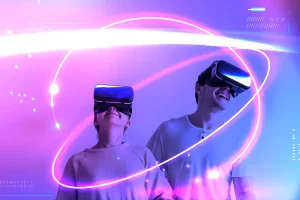- 23 August 2024
- 1021
How Technology is Shaping the Future of Entertainment

Introduction
The entertainment industry has always been a dynamic and evolving sector, driven by the relentless march of technology. From the early days of silent films to the immersive virtual reality experiences of today, technology has consistently redefined the boundaries of what is possible. This article delves into the myriad ways technology is shaping the future of entertainment, exploring the latest advancements and their potential impact on how we consume and interact with media.
The Evolution of Entertainment Technology

-
Early Innovations
The journey of entertainment technology began with the invention of the motion picture camera in the late 19th century. The ability to capture and project moving images revolutionized entertainment, giving birth to the film industry. The advent of sound in films during the 1920s further enhanced the cinematic experience, making movies more engaging and realistic.
-
The Television Era
The mid-20th century saw the rise of television, bringing entertainment directly into people’s homes. This era marked a significant shift in how content was consumed, with families gathering around the TV to watch their favorite shows. The development of color television in the 1960s added a new dimension to the viewing experience, making it more vibrant and lifelike.
-
The Digital Revolution
The late 20th century and early 21st century witnessed the digital revolution, which transformed the entertainment landscape once again. The introduction of digital media, the internet, and streaming services changed how content was produced, distributed, and consumed. Platforms like Netflix, YouTube, and Spotify have become household names, offering on-demand access to a vast array of movies, TV shows, music, and more.
Current Technological Trends in Entertainment

-
Streaming Services
Streaming services have become the cornerstone of modern entertainment. These platforms offer unparalleled convenience, allowing users to access a vast library of content anytime, anywhere. The use of algorithms to recommend personalized content has further enhanced the user experience, making it easier for viewers to discover new shows and movies tailored to their preferences.
-
Virtual Reality (VR) and Augmented Reality (AR)
Virtual reality (VR) and augmented reality (AR) are poised to revolutionize the entertainment industry. VR provides an immersive experience by transporting users into a virtual world, while AR overlays digital elements onto the real world. These technologies are being used in various entertainment sectors, from gaming and movies to live events and theme parks, offering new ways to engage and entertain audiences.
-
Artificial Intelligence (AI)
Artificial intelligence (AI) is playing an increasingly significant role in the entertainment industry. AI algorithms are used to analyze user data and preferences, enabling personalized content recommendations. In addition, AI is being used in content creation, such as generating realistic CGI characters and environments, as well as in scriptwriting and music composition.
-
Interactive and Immersive Experiences
The demand for interactive and immersive experiences is growing, driven by advancements in technology. Interactive storytelling allows audiences to influence the narrative, creating a more engaging and personalized experience. Immersive experiences, such as escape rooms and interactive theater, are also gaining popularity, offering a more active form of entertainment.
-
Blockchain and NFTs
Blockchain technology and non-fungible tokens (NFTs) are making waves in the entertainment industry. Blockchain offers a secure and transparent way to manage digital rights and royalties, while NFTs provide a way to own and trade unique digital assets. These technologies have the potential to reshape the way content is monetized and distributed, offering new opportunities for creators and consumers alike.
The Future of Entertainment Technology

-
Enhanced Personalization
As technology continues to evolve, the future of entertainment will be increasingly personalized. AI and machine learning algorithms will become more sophisticated, allowing for even more accurate content recommendations. This will enable platforms to deliver a highly tailored experience, catering to individual tastes and preferences.
-
Advanced VR and AR Experiences
The future of VR and AR holds immense potential. Advances in hardware and software will lead to more realistic and immersive experiences. For example, haptic feedback technology could allow users to feel physical sensations in a virtual environment, while improved AR glasses could seamlessly integrate digital elements into the real world.
-
The Rise of Metaverse
The concept of the meta verse a virtual universe where users can interact with each other and digital environments is gaining traction. Companies like Facebook (now Meta) are investing heavily in building meta verse platforms. This could revolutionize entertainment by creating a new digital playground where people can socialize, play games, attend events, and even work.
-
Ethical and Inclusive Content
As technology advances, there will be a growing emphasis on ethical and inclusive content. This includes ensuring diversity and representation in media, as well as addressing issues related to data privacy and digital well-being. Technology can also be used to create accessible content for people with disabilities, ensuring that entertainment is inclusive for all.
-
Sustainable Production
The entertainment industry is becoming increasingly aware of its environmental impact. Advances in technology can help make production processes more sustainable. For example, virtual production techniques, which use LED screens and computer-generated environments, can reduce the need for physical sets and travel, minimizing the industry’s carbon footprint.
Conclusion
Technology is undeniably shaping the future of entertainment, offering new ways to create, distribute, and consume content. From the rise of streaming services and immersive VR experiences to the potential of the meta verse and AI-driven personalization, the possibilities are endless. As we move forward, it will be crucial to navigate the ethical and inclusive implications of these advancements, ensuring that the future of entertainment is not only innovative but also equitable and sustainable. The entertainment landscape is on the brink of a technological renaissance, promising a future where the boundaries of imagination and reality are increasingly blurred.

